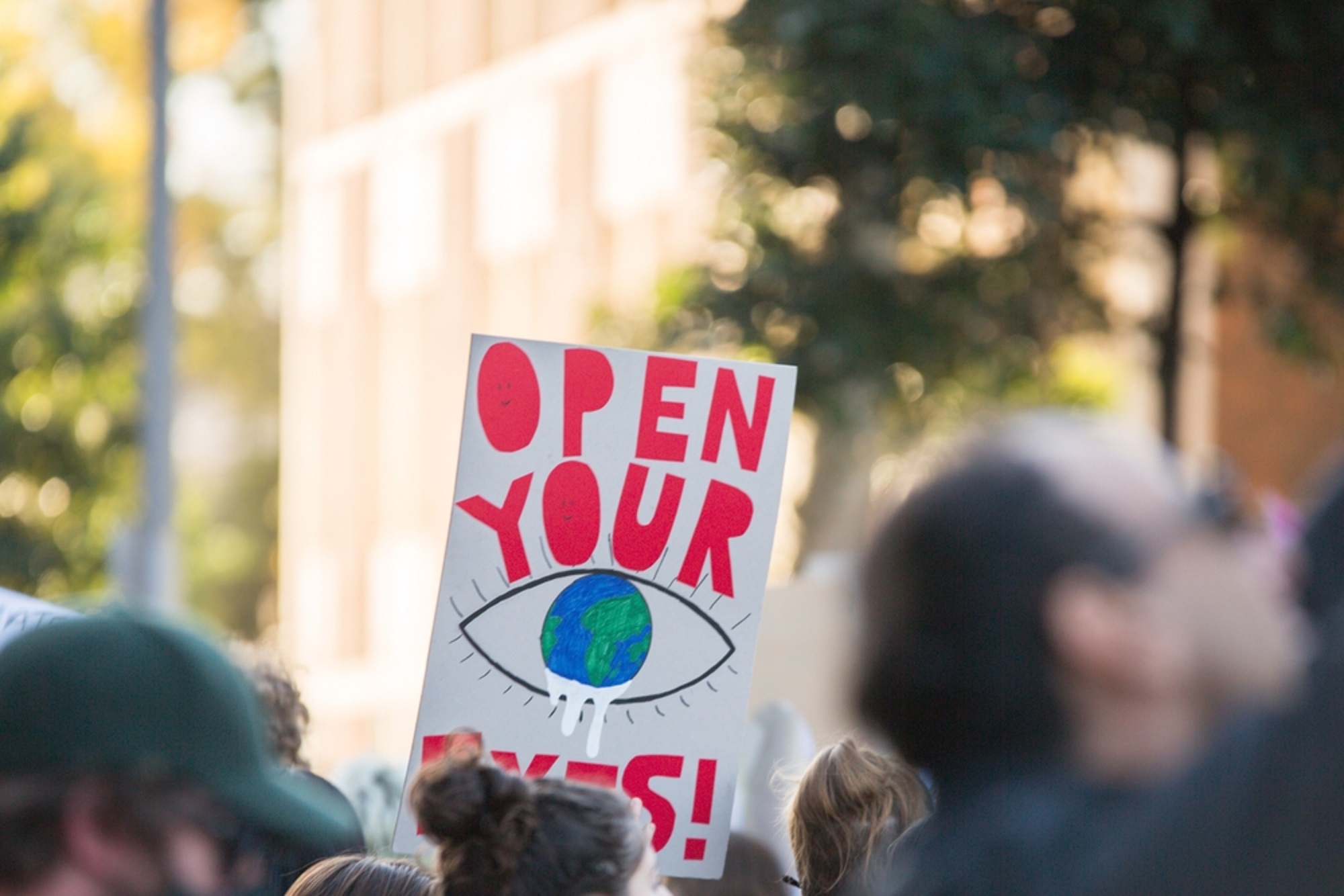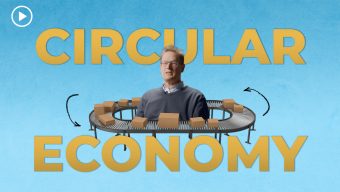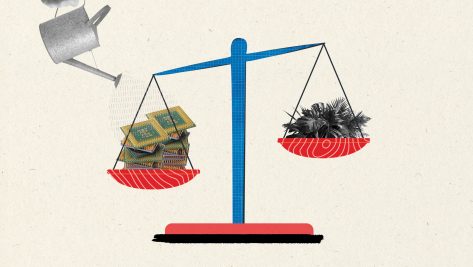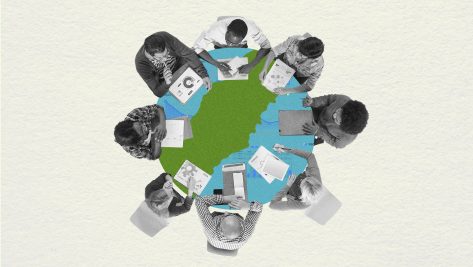A comet of catastrophic dimensions hurtling towards the earth is a metaphor for the climate crisis in the film Don’t Look Up. Scientists played by Leonardo DiCaprio and Jennifer Lawrence, sound the alarm but it’s not politically convenient for Meryl Streep’s Trump-ish U.S. President, who proceeds to deflect attention from the warning. When the information finally makes its way to the public, she implores people to ignore it with the slogan, “don’t look up.” It’s an entertaining way to illustrate how leaders can easily exploit tribalistic partisan divisions with simplistic or negationist claims, even in the face of an existential threat. At the end of the movie (Spoiler alert!), the comet destroys the earth and everyone on it.
It is also a cynical view of our ability (and lack thereof) to distinguish fact from fiction, which plays into the so-called third-person effect: our tendency to believe that media messages have a greater effect on others than on ourselves. Yet, if we believe that people in a big enough number to tip the public opinion scale on climate can be so easily taken in by anti-scientific information, then public opinion is an unreliable mechanism for pressuring elected officials on policy of any kind, let alone actions to mitigate climate change.
This, in turn, is a damning judgment of democratic rule by the people. But it’s extremely uncomfortable to assert that people are too stupid for self-determination, so we don’t put it that way and Don’t Look Up certainly didn’t. Instead, it’s much more comfortable to blame the messenger, and wring our hands over the rampant disinformation flowing through social media (and often from leaders themselves.) Disinformation is indeed a problem that’s difficult to address. But is disinformation really hoodwinking so many people into climate change denialism that it is holding policymakers back from taking real action?
United Nations Secretary-General Antonio Guterres used this argument when he warned the UN General Assembly on January 21st that “we face a 5-alarm global fire.” Among these five alarms, he called out the climate crisis and a digital chaos caused by disinformation. He argued that disinformation complicates all transnational challenges, but especially climate, casting doubt on scientific consensus and fueling climate change deniers around the world.
Climate disinformation persists, is amplified by social media, and is extremely difficult to control. But it is also a convenient bogeyman for climate inaction. A bogeyman that feeds off two assumptions: first, that enough people are influenced by disinformation to draw a majority (or at least an un-ignorable minority) into the denier camp and, second, that public opinion actually holds sway over climate policymaking at the national and international level.
The problem with this argument is that the data just doesn’t support it. The people of the world are very concerned about climate change and want to see action from leaders. If anything, the real issue is that leaders are not responding to public opinion, especially at the international level.
Based on public opinion data, it is difficult to conclude that disinformation campaigns are winning the influence game.
Despite disinformation efforts, recent figures from Pew Research Center survey of 17 advanced economies across North America, Europe, and the Asia-Pacific show that a solid majority of 72% is greatly concerned about climate change and that it will harm them (as opposed to the 27% who aren’t concerned). Even more people, 80% of those surveyed, are willing to make changes in how they live and work in order to address it (opposed to 19%). Yet only 56% (vs. 44%) believe that their own society is doing a good job addressing climate change and they are more doubtful that action taken by international institutions will make any difference, with 52% saying they don’t have much confidence vs. 46% who are more confident.
In the US, which is notable for right-wing climate deniers and anti-vaxxers, two-thirds of those surveyed by Pew Research believe the government should do more on climate. This rings true when I think about my own American friends who vote Republican and even voted for Trump but do deeply care about the environment and combatting the climate crisis.
Based on public opinion data, it is difficult to conclude that disinformation campaigns are winning the influence game, and academic research backs this up. In a paper published last year in Social Media + Society, Andreas Jungherr and Ralph Schroeder note that while disinformation is commonly seen as a threat to democracy, empirical findings instead “indicate that disinformation is a limited problem with limited reach among the public. Its prominence in public discourse is instead best understood as a ‘moral panic.’”
New research by political scientists Yanna Krupnikov and John Barry Ryan dovetails with this, suggesting that the common wisdom that we are hopelessly divided is wrong. The data they come up with shows that there is a more important gulf between Americans that are deeply involved in politics and those who are not. They argue that the people who are intensely engaged in politics – those who are loudly proclaiming their views during dinner parties or on social media – only make up 15-20% of the country. The other 80% just can’t be bothered because they are more involved in their day-to-day lives.
Yet, this minority of political fanatics drives our understanding of divisive issues and partisan politics because their already booming voices get amplified. First, by the social networks which are designed to drive traffic towards the most hair-raising content and ideas through algorithms. While social media companies protect these algorithms as proprietary, we do know that they are designed to serve us more and more extreme content that drives us further down an addictive rabbit hole.
These zealous voices are then further amplified by traditional media which desperately seeks clicks and eyeballs and therefore focuses on conflict. This extreme, hyper-partisan minority and their crazy stories are important evidence of this riveting narrative of deep division driven by social media. And so goes this vicious cycle that leads us to believe the world has gone mad and that the social media that we are all so addicted to is wrecking democracy.
The jury is out as to whether public opinion can or even should influence policy makers when it comes to international affairs. Political scientists have long questioned whether the public has enough knowledge or even interest in international affairs to justify paying attention to their views. At the national level, the ultimate public opinion poll is an election. Ideally, politicians must make their case to the people for and against specific political prescriptions during their campaigns.
If our national governments don’t get elected on climate… then it just won’t get the same priority as the economy.
Yet, we are not computers, we are highly emotional and tribal human beings. Jonathon Haidt’s book The Righteous Mind puts forth both of these cases and in fact, explains the science behind our emotional decision-making. It follows that elections don’t show a direct line between public opinion on every issue and who gets elected. Some issues play a bigger role, like the economy, while others, such as climate change, might be seen as important when polled on their own, but fall to the background when compared with others.
In the 2020 US presidential election, only 42% of voters said climate change was very important to their vote, coming in 11th place behind the number one issue, the economy, which garnered 79%, then healthcare at 68%, and Supreme Court appointments at 64%. It’s not much different in Spain, where there is high concern about the climate crisis (it has risen from 36% to 46% since 2015) yet surveys show that the public is most concerned about unemployment and the economy, recently followed by the pandemic.
If our national governments don’t get elected on climate, and therefore don’t have their feet held to the fire on the issue, then it just won’t get the same priority as the economy. If we take this to the international level, it just gets more difficult because the leadership of multilateral institutions is mostly appointed by national elected officials. This is what political scientists call indirect legitimacy. In other words, the appointment of international representatives and leaders is considered democratically legitimate because they are appointed by democratically elected leaders. Even so, the result makes it very difficult for citizens of the world to hold international leaders accountable for anything, let alone the arduous task of addressing climate change.
There is no doubt that the issue of disinformation deserves attention. But, rather than look to the “global code of conduct” that Guterres suggests to fight the “infodemic,” efforts should focus on improving media literacy as well as holding social media companies accountable for their algorithms. We need to know exactly how extreme views and disinformation are pushed at us so we can demand change. Blaming disinformation for the lack of progress towards stopping a climate catastrophe is an easy way to deflect our attention from the underlying challenge of reforming international institutions like the UN to become more accountable to global public opinion.
A version of this article originally ran in Spanish with esglobal and it was written as part of the 1 Planet 4 All project.
© IE Insights.











